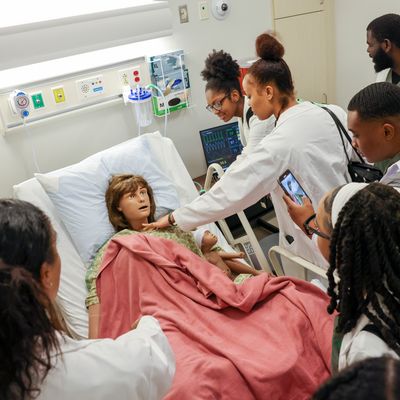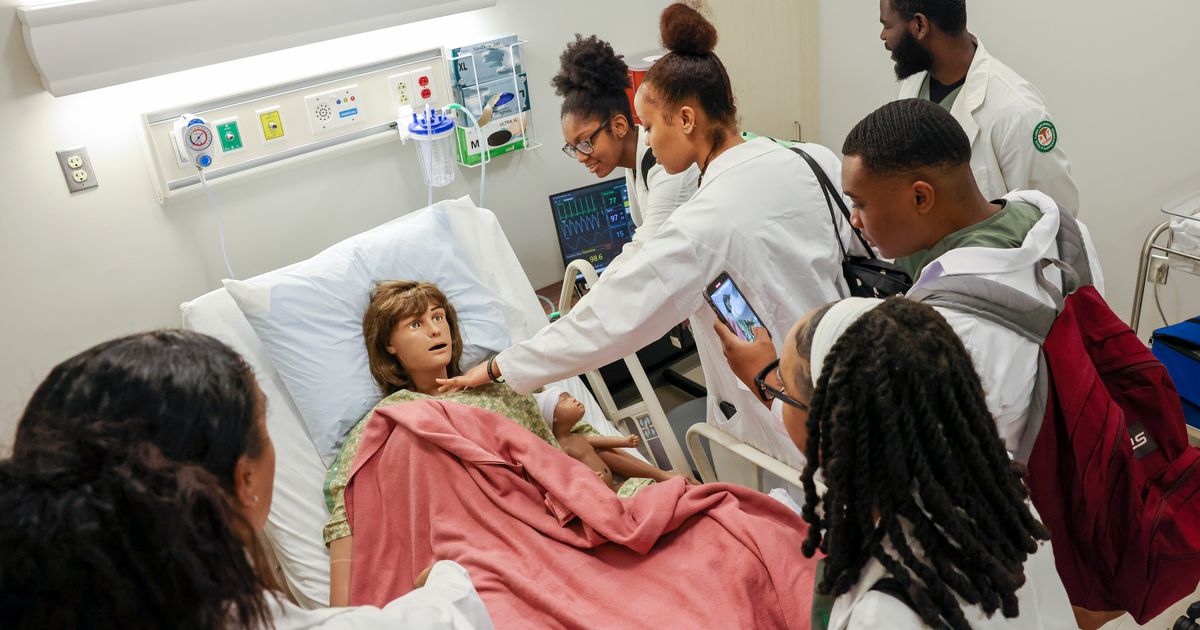
FAMU School of Nursing students work in the new simulation lab in Tallahassee in April 2023.
Photo: Glenn Beil/Florida A&M University/Getty Images
In July, President Donald Trump signed the Republican-crafted One Big Beautiful Act into law, a legislative behemoth that boasted close to $4.5 trillion in tax cuts and changes to society-safety programs that sparked the ire of fiscal hawks and Democrats alike. But deep within the massive bill was a less discussed change to the federal government’s financial-aid program with significant implications for students across a variety of fields — including nursing, the nation’s largest health-care profession.
As part of the funding package, the U.S. Department of Education is ending the Grad PLUS loan program, which allows prospective graduate students to borrow up to the full cost of attendance. Instead, the agency will be instituting borrowing caps, making the maximum figures dependent on whether a student is pursuing a “professional degree.” Currently, the list of the graduate programs designated as professional spans a variety of fields, from medicine, dentistry, and law to more surprising inclusions like theology. One notable exemption is that of nursing.
Under the proposed language, graduate students pursuing a “professional” degree will be allowed to borrow up to $50,000 annually with an aggregate loan limit of $200,000. But a prospective student enrolled in a graduate nursing program could seek only up to $20,500 annually with an overall limit of $100,000. The changes will officially go into effect on July 1, 2026.
Nurses have taken to social media to voice their concerns and anger over the shift. “If you are ever sick and need to see a provider, need a referral, need an epidural, or need any form of healthcare, this should outrage you,” @amypereztxx posted on TikTok. “I heard nursing is no longer a professional degree … now I’m allowed to act as unprofessional as I can,” wrote @nurse_gibby. TikTok user @hey_yall_its_eli, who identifies as a pediatric-oncology nurse, said, “I love having a career that’s no longer considered professional by a man who can’t even say acetaminophen.”
The loan caps will have a significant impact on aspiring nurses, who will be forced to foot a large portion of their education costs themselves or may even decide against a nursing career entirely, warned American Nurses Association president Jennifer Mensik Kennedy.
“The average cost of attendance is about $30,000 a year for graduate and doctoral students. What you’re looking at is a $10,000 difference that needs to be made up, which is going to be very hard,” she said. “What you’re going to see is maybe people go to get private loans, but private loans are much harder to get. They have higher interest rates.”
Mensik Kennedy noted that the use of private loans will also limit nurses’ ability to utilize the government’s public-loan-forgiveness program for those who choose to work in public health or in underserved communities. “So we’re taking additional incentives away, unintentionally, for people to serve those communities,” she said.
The limits will have an outsize impact on advanced-practice nurses: registered nurses with advanced degrees whose responsibilities range from primary-care providers to more specialized roles such as nurse practitioners, nurse anesthetists, and nurse midwives. Mensik Kennedy said advanced-practice nurses are often the lead medical provider in smaller, more rural regions with less access to medical care, noting that she spoke to one nurse practitioner who was the only provider within 90 miles of where they practice.
“Certified registered-nurse anesthetists oftentimes are the only anesthesia provider for rural communities. So if you need surgery or you need anesthesia, that is the only option. If those rural hospitals cannot get a CRNA, then they cannot do surgeries and you’re going to have people traveling hundreds of miles to go get care they could have gotten in their own community,” she said.
The federal government has taken the position that placing these new loan limits will eventually help to lower costs for graduate programs over time. And the Department of Education has challenged assertions from nursing advocates that its recent moves will exacerbate the ongoing nursing shortage, issuing a fact sheet that claims that 95 percent of nursing students “borrow below the annual loan limit” and noting that undergraduate nursing programs will not be affected.
“The definition of a ‘professional degree’ is an internal definition used by the Department to distinguish among programs that qualify for higher loan limits, not a value judgment about the importance of programs. It has no bearing on whether a program is professional in nature or not,” the agency said.
But Mensik Kennedy fears the limits could prompt a ripple effect that risks worsening the ongoing nursing staffing crisis that was already exacerbated by high rates of retirements and burnout stemming from the pandemic.
“We already have, on average, a 6 percent shortage of nurses. And if people aren’t going to continue and go into nursing school, that shortage is going to get worse as we have this large population of baby-boomers retiring,” she said. “People are going to see longer waits in the emergency department. They’re not going to be able to find a primary-care provider in their community.”
The situation is not yet set in stone. The official rule defining a “professional” student still has to undergo a 30-day public-comment period, and the Education Department has not ruled out making changes to the definition in reaction to feedback.
Professional associations like the ANA are continuing to advocate for an adjustment to the proposed wording as leaders warn that the fallout from this seemingly small rule could have ramifications for years to come if passed.
“We’re going to have a downward effect that’s going to affect us for decades — because it’s going to take us decades to climb out of this mess if this is allowed to go through,” Mensik Kennedy said.
Sign Up for the Intelligencer Newsletter
Daily news about the politics, business, and technology shaping our world.
Vox Media, LLC Terms and Privacy Notice

